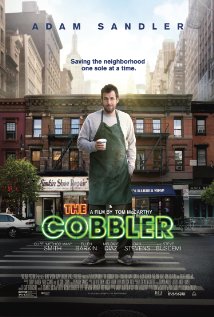
THE COBBLER
US, 2014, 99 minutes, Colour.
Adam Sandler, Steve Buscemi, Melonie Diaz, Ellen Barkin, Dan Stevens, Cliff ‘Method Man’ Smith, Fritz Weaver, Dustin Hoffman.
Directed by Tom Mc Carthy.
The Cobbler is an unusual project for writer-director Tom Mc Carthy, a frequent actor but moving into writing and direction with The Station Agent and consolidating his direction career with such films as The Visitor. He also wrote the screenplay for the Indian baseball film,. He received great prominence for his writing and direction of the multi-award nominated exposé by the Boston Globe of clerical sexual abuse in Boston, Spotlight.
While many of Adam Sandler’s comedies have been very popular, he generally has not received much critical support. However, he has made different attempts to take on more serious roles in films including Click, Spanglish, funny People, and now, this Jewish fable of New York, The Cobbler.
The basic premise is that a Jewish ancestor was given the gift of a magic stitcher for mending shoes. In the 21st century, Max, Adam Sandler (and the Hebrew word for Cobbler is Sandler), is weary of his boring business, looks after his mother who is losing her memory, is friendly with the barber next door, Jimmy, Steve Buscemi, is invited to participate in protests against corporate takeovers of buildings by an energetic campaigner, Melonie Diaz, which leads him to the confrontation with the corporate boss, Ellen Barkin.
The basic premise is that we know people better if we walk in their shoes. This is taken literally when Max has to use the old machine for an emergency task, tries on the shoes, and has taken on the appearance of the owners. There is quite a collage of different owners, old and young, men and women, ugly and presentable.
There are many comic touches, Adam Sandler style, and some adventures – and a welcome appearance by Dustin Hoffman as Max’s father.
1. A comedy fable? The message of walking in another’s shoes? Literally? Figuratively?
2. A New York Jewish story? The early 1900s, Lower East Side? The same setting in the 21st century? The streets, the shoemaker’s, the barber’s? The issues of development, old homes and apartment blocks, demolition sales, fraud and deals? Gangsters?
3. The range of people and their shoes being repaired, as individuals, different ages, gender, race, the different appearances? This range of people used as a dramatic as well as a comic device?
4. The prologue, 1903, the story about the stitcher and the gift, its powers? The father handing on the information and the business to his son? Succeeding generations?
5. Max in the 21st century, inheriting the business from his father, his father’s disappearance, his mother at home, his living with her, caring for her, her dementia? Her watching the television, concerned about her son? His not being married? His friendship with Jimmy, the barber next door? His being bored with his job? Interactions with the customers? Kindly old ladies giving him things for his mother, Jimmy’s gifts?
6. Ludlow, the demand for his shoes, the machine breaking down, going to the stitcher, trying on the shoes, his looking like the owner of the shoes, size 10 ½?
7. More customers, more shoes, finding the 10 ½, the range of characters, his appearance, his reaction? Seeing the glamorous woman and the young man with his chauffeur, her coming to the store, mending his shoes, taking on his identity, seeing the girl in the shower, at the bar, the comment about his date, a man? The young boy, big-boned?
8. His assuming the different characters, the confrontation with Ludlow, in his apartment, the Taser, the watches, buffaloes girlfriend and her angry reaction, his later delivering the watches to her, tying him up, the different gangsters coming? As the tall woman? Getting the money? His changing shoes and changing personalities, the car crash? people upset?
9. Carmen, her visit, the campaign, the tenants of the neighbourhood, Mr Solomon, his stance against the developers, the protests? Max being polite, discovering the criminals, meeting Elaine, her cooking duck, the confrontation, his wanting to thwart her plans?
10. Elaine, the development, her Asian buyers, her henchmen, the plan to burn down the building, burn Mr Solomon? Max, his intervention, playing with the two henchmen, taking on their appearances, tying them up, the discussions with Mr Solomon, getting him to Chicago, Max impersonating Mr Solomon, thwarting the plans, the television interview with Elaine and her exposure?
11. His meeting with the television interviewer, his mother liking him, pleasant, using him for the exposé?
12. His impersonating his father, his mother’s last wish, having dinner with her, the pathos of her death? Max being distraught? Jimmy and his concern?
13. Carmen, the date, a future?
14. Jimmy, his concern, the pickles? Jimmy knowing about the transformations? The revelation that under his appearance was actually Max’s father, unable to tell the truth, the past experience with gangsters, his disappearance? Regretting his absence from his wife? Being next door to protect Max? The real Jimmy in the Caribbean?
15. Downstairs, the luxury car, his father’s different existence – and the repercussions for Max, in himself, memory of his father and reuniting with him, Carmen and his future?
16. How effective as a New York Jewish fable?